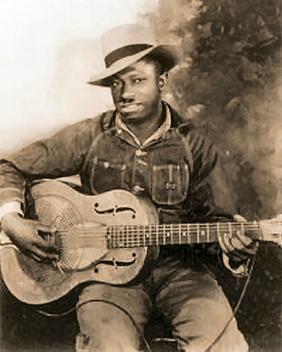
The Central Intercollegiate Athletic Association (CIAA) is a college athletic conference affiliated with the National Collegiate Athletic Association (NCAA) at the Division II level, whose member institutions consist entirely of historically black colleges and universities (HBCUs).

Lynchburg is an independent city in the Commonwealth of Virginia in the United States. First settled in 1757 by ferry owner John Lynch, the city's population was 79,009 at the 2020 census, making Lynchburg the 11th most populous city in Virginia. Located in the foothills of the Blue Ridge Mountains along the banks of the James River, Lynchburg is known as the "City of Seven Hills" or the "Hill City". In the 1860s, Lynchburg was the only city in Virginia that was not recaptured by the Union before the end of the American Civil War.

Willie Gary "Bunk" Johnson was an American prominent jazz trumpeter in New Orleans. Johnson gave the year of his birth as 1879, although there is speculation that he may have been younger by as much as a decade. Johnson stated on his 1937 application for Social Security that he was born on December 27, 1889. Many jazz historians believe this date of birth to be the most accurate of the various dates Johnson gave throughout his life.

Gary D. Davis, known as Reverend Gary Davis and Blind Gary Davis, was a blues and gospel singer who was also proficient on the banjo, guitar and harmonica. Born in Laurens, South Carolina and blind since infancy, Davis first performed professionally in the Piedmont blues scene of Durham, North Carolina in the 1930s, then converted to Christianity and became a minister. After moving to New York in the 1940s, Davis experienced a career rebirth as part of the American folk music revival that peaked during the 1960s. Davis' most notable recordings include "Samson and Delilah" and "Death Don't Have No Mercy".
"Cocaine Blues" is a Western swing song written by Troy Junius Arnall, a reworking of the traditional song "Little Sadie." Roy Hogsed recorded a well known version of the song in 1947.
Henry Franklin "Dick" Justice was an American blues and folk musician, who hailed from West Virginia, United States.

Robert Petway was an American blues singer and guitarist. He recorded only 16 songs, but it has been said that he was an influence on many notable blues and rock musicians, including John Lee Hooker, Muddy Waters, and Jimi Hendrix. There is only one known picture of Petway, a publicity photo from 1941. His birth name may have been Pettyway, Pitway, Petaway, or similar.

Otis Lee Clay was an American R&B and soul singer, who started in gospel music. In 2013, Clay was inducted to the Blues Hall of Fame.
Ralph Willis was an American Piedmont blues and country blues singer, guitarist and songwriter. Some of his Savoy records were released under the pseudonyms Washboard Pete, Alabama Slim, and Sleepy Joe. His famous song is "Christmas Blues".
Blind John Davis was an American blues and boogie-woogie pianist and singer. He is best remembered for his recordings, including "A Little Every Day" and "Everybody's Boogie".
Luke "Long Gone" Miles was an American Texas blues and electric blues singer and songwriter. He was a protégé of Lightnin' Hopkins and variously recorded or performed with Hopkins, Sonny Terry, Brownie McGhee and Willie Chambers. Miles is best known for his 1964 album Country Born, issued by World Pacific Records.
L. C. McKinley was an American Chicago blues guitarist. He worked with Eddie Boyd and Ernest Cotton. A performer in the Chicago blues scene, McKinley's major output was as a session musician on recordings made mostly in the 1950s.
Palmer Braden McAbee was an American blues harmonica player. Little is known of his life.
"Bogus" Ben Covington was an American country blues singer, harpist, and mandolin-banjo player. Originally a resident of Louisiana, Covington was active in Mississippi and recorded in the late-1920s and 1930s, presumably under various names such as Blind Ben Covington, Ben Curry, and Memphis Ben. He also occasionally performed alongside Big Joe Williams, King Solomon Hill, and Speckled Red.
Frederick "Rick" Franklin is an American Piedmont blues guitarist, singer and songwriter. With various other musicians, Franklin has released four albums to date and works as a blues musicologist.

The Swarthmore Concert, subtitled King of the Blues, is a live album by the blues musician Lightnin' Hopkins, recorded at the Swarthmore College Folk Festival in 1965. It was originally released as part of the seven-CD box set Lightnin' Hopkins: The Complete Prestige/Bluesville Recordings, in 1991, before being reissued on Bluesville as a single CD in 1993.
James "Boodle It" Wiggins was an American blues singer and musician. His best known recordings were "Keep Knockin' An You Can't Get In", a precursor of both "Keep A-Knockin'" and "I Hear You Knocking"; plus his versions of "Corrine, Corrina" and "Shave 'Em Dry", albeit slightly re-titled.

The Complete Plantation Recordings, subtitled The Historic 1941-42 Library of Congress Field Recordings, is a compilation album of the blues musician Muddy Waters' first recordings collected by Alan Lomax for the Library of Congress in 1941-42 and released by the Chess label in 1993. Lomax recorded Waters at Stovall Farm in Clarksdale, Mississippi in 1941 and returned the following year to make additional recordings. Thirteen tracks were originally released as Down on Stovall’s Plantation in 1966 on Testament Records.
Thomas F. McFarland, known professionally as Barrelhouse Buck McFarland was an American blues and boogie-woogie pianist, singer and composer. He first recorded material in the early 1930s, but had to wait until three decades later, before providing his 'barrelhouse' swan song.








